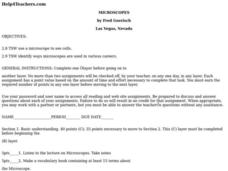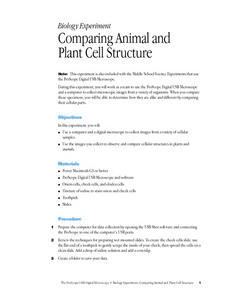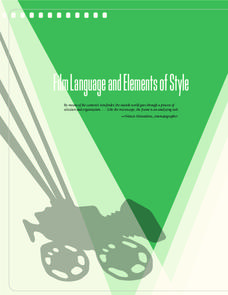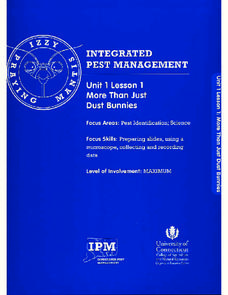Curated OER
Microscopes: Is what you see, what you got?
Eighth graders identify the parts and functions of the microscope. For this biology lesson, 8th graders observe different samples under different types of microscopes. They compare and contrast the details they see.
Curated OER
How Can We Study the Differences in Animal and Plant Cells Using the Compound Microscope?
Students examine their cheek cells with a compound microscope. They identify different parts of the cell. They compare and contrast animal and plant cells with the microscope as well.
Curated OER
Microscopes
Students investigate how microscopes are used. They identify ways microscopes are used to see cells and in various careers. They complete activities involving creating a vocabulary book, crossword puzzles, designing posters, and...
Curated OER
Microscope Word Search
In this word search worksheet, students locate 12 words related microscopes. The word list includes ocular lens, and stage clips.
Curated OER
The Parts of a Perfect Flower
Young scholars explore the parts of a flower. In this flower structures lesson plan, students study a model of a flower and dissect a flower. They label each structure of the flower and observe the pollen grains and ovules under the...
Curated OER
Hairy Evidence! Hair Identification
Provide a mystery hair and a set of reference hair samples for middle school investigators to place on a slide and examine under a microscope. Materials and procedures are detailed on the first page, while a data table for drawing what...
National Nanotechnology Infrastructure Network
Big vs. Little - Macro to Micro Lesson 2
The big world is full of tiny surprises. Classes discover all things big and small while completing the second lesson of a five-part series comparing macro- and micro-objects. Learners collect items from around the room including things...
Curated OER
Microscope Basics
Students examine a microscope and learn its parts. In this microscope lesson students study the different parts of the microscope and see the differences in the adjustments then make their own wet slide.
Curated OER
Microscope Mania Quiz
Students explore the parts of the microscope. In this microscope instructional activity students are given a quiz on the parts of a microscope.
Curated OER
Elaine Humphrey, Gwynne Thompson
Second graders become familiar with the parts of the microscope and how it works. In this microscope lesson, 2nd graders experiment with different light and settings. Students answer questions based on their experiment.
Curated OER
Focusing on Lenses
Students explore scientific observations by examining the parts of a microscope. In this optics lesson, students discuss the importance of a focal point and focal distance when utilizing an optical device such as a microscope. Students...
Curated OER
Comparing Animal and Plant Cell Structure
High schoolers work as a team to use the ProScope Digital USB Microscope and a computer to collect microscopic images from a variety of organisms. When they compare these specimens, they are able to determine how they are alike and...
Curated OER
Get Crafty! Integrate Art and Science
By combining diverse subjects, you will create some of your most memorable lessons.
Curated OER
Regents High School Examination: Living Environment 2010
This exam touches upon every topic within the typical first year biology course.. A broad variety of question styles give high schoolers every opportunity to show what they know. Why start from scratch when a comprehensive final exam is...
Film Foundation
Film Language and Elements of Style
How do you read a frame? How do you read a shot? Here's a resource that shows viewers how to read films. As part of the study, class members examine the camera angles, lighting, movement, and cinematic point of view in Mr. Smith Goes to...
Baylor College
Magnifying and Observing Cells
Though it isn't a novel activity to prepare onion cell and Elodea plant cell slides as examples of cells in a microbiology unit, this resource will leave you thoroughly prepared. As pupils examine the slides that they prepare, they draw...
Curated OER
Using Microscopes
Students do an experiment using a microscope. In this lesson, about cells, students examine different slides using a microscope. Students look at an onion skin, cheek cells, and potato cells. In each of these, students find cell walls,...
Curated OER
Cells And Their Parts
Learners investigate different types and their parts. They differentiate prokaryote and eukaryote cells and create a venn diagram displaying differences or similarities. Students write ten similes related to the cells and parts of them.
Curated OER
Microscopes
In this microscope worksheet, students complete a word search by finding the 22 terms associated with the parts of a microscope.
Curated OER
Creating a Universally Designed Lesson Plan
Students investigate plant cells. In this multiple intelligences lesson, students engage in a variety of activities to foster an understanding of plant cells and how they work. Students read, write, observe, and role-play parts and...
Curated OER
Cells: Nature's Building Blocks
What you will find on this page is the general outline of a unit on the use of a microscope and the structure of the cell. There is no actual educational content here, so you will need to design the details of each of the four student...
University of Connecticut
More Than Just Dust Bunnies
Teenagers will never complain about cleaning their rooms after this activity. In the first lesson of a four-part series, budding scientists collect samples of dust, chalk, and other particulates from various areas of the classroom. They...
Nuffield Foundation
Observing Water Moving Through Plants
We know plants assist in the water cycle, but how do plants get water from the ground into the air? Through a series of demonstrations or labs, scholars observe the movement of water through plants. They microscopically view the cells...
Rural Science Education Program
Bees and Flowers – Partners in Pollination
Why are bees so important? After several activities where kids investigate the form and function of flowers, they learn about the different types of bees and label them. They then examine pollen under a microscope and decide which bees...
Other popular searches
- Microscope Parts
- Compound Microscope Parts
- Label Microscope Parts
- Microscope Parts Functions
- Identify Microscope Parts
- Biology Lab Microscope Parts
- Microscope Parts Lab
- Microscope Parts and Use
- Microscopes Parts
- Parts of the Microscope Pdf

























